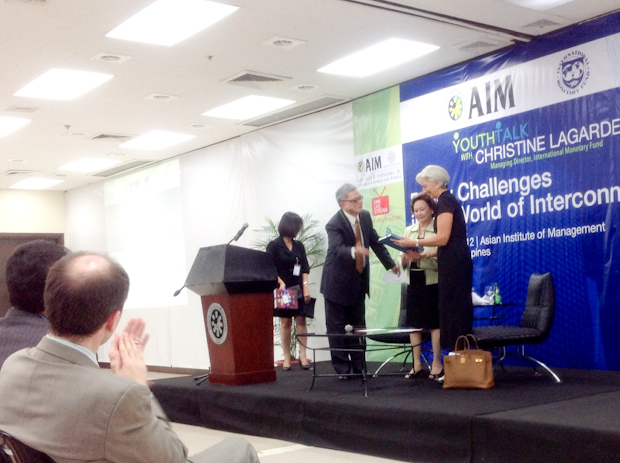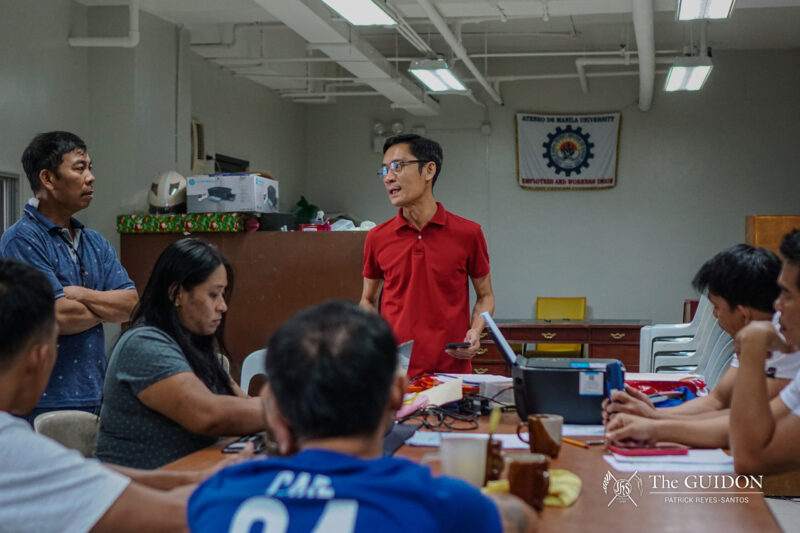
VISITING SOUTHEAST ASIA. International Monetary Fund Managing Director Christine Lagarde (rightmost) receives a token of appreciation after speaking at a youth forum held at the Asian Institute of Management in Makati. In her talk, she stressed the importance of Asia in today’s global economy. Photo by Michael C. Cruz
LOOKING DIGNIFIED and keeping a friendly tone, International Monetary Fund Managing Director Christine Lagarde spoke to a group of college students and professionals at a forum at the Asian Institute of Management in Makati last November 16, as part of her two-day visit to the Philippines.
The IMF chief talked about current trends in globalization and interconnectedness, the current crises in Europe and the United States, and the growing role of Asia in the global economy.
PH and the globalized economy
Lagarde talked about how policymakers are only beginning to grasp the complexity of interconnections in the globalized economy. “One of the lessons that we are learning from this crisis, and that we have largely underestimated… is the true extent of economic and financial interconnections between regions, countries and people,” she said.
“The smallest economic drumbeat can actually have massive deflagration effects around the world… Those are the kinds of interconnections that we have to put off with, if we cannot find an off button [or] a pause button.”
Despite the risks highlighted by the financial crisis, Lagarde noted, “What we must do is accept this interconnectedness, not turn our back to it. But make sure that we actually draw the benefits of it, the positive, and make sure that we identify early enough… all the negatives.”
Department of Leadership and Strategy Chair Darwin Yu agreed, saying, “I don’t think there’s any other direction that it will go. I believe that the Philippines will be more and more integrated into the world economy, and it has its risks as well as its rewards. The risks are that whatever happens in other countries happens to us, too.”
However, Yu added that “to some extent, we are protected, partly, [because] our level of exports is not that high. The amount of US Treasury bills or European bonds that we buy are not that much either.”
Lagarde also commended overseas Filipino workers, calling them “the buffer that protects the Philippine economy.”
Glowing reception
If there is one impression that the attendees agreed on, it was that the speech of Lagarde was not one usually heard from IMF managing directors.
“There were many times in her speech that she didn’t sound like an IMF Managing Director… For example, when she says that, in managing the global financial crisis, she’s concerned about generating jobs—which is unusual for the managing director of the IMF to say,” said Development Studies Program Director Leland Dela Cruz.
At one point, Lagarde insisted on making the creation of jobs a priority. “Now, it’s a bit funny for the Managing Director of the IMF to talk about jobs, and I [think so, too]. I claim the privilege to talk about jobs as a priority,” she said.
Towards the end of her speech, she stressed that “growth should be inclusive” and that “globalization must benefit all—not just the educated.”
Lagarde also called for a “rebalancing of demand from the developed countries to the emerging countries, especially ones in Asia.” She then proceeded to talk about solving inequality and poverty in Asia.
For Dela Cruz, the contrast was clear. “When we were having our problems in the 1980s, you could simply say that [the IMF] couldn’t care any less about what happens to our jobs here. They were mandating structural adjustment policies, together with the World Bank.”
Audience members also had good things to say about Lagarde’s tone and speaking style. Jamil Francisco of the Economics Department described the setting. “I was quite impressed by how she made her key points easily understood and actually connected with the young audience, even during the Q&A. I don’t think there was anything controversial or new about what she discussed in that particular talk, which was probably deliberate on her part especially since it was a youth forum,” he said.
A positive outlook for Asia
Lagarde’s speech was full of optimism about the future, particularly for Asia. She said that she believes that the Asian experience with financial crises, particularly in 1997, holds lessons for the current crisis faced by the developed world.
“Asia was an early adopter of the interconnected world. It saw the opportunities, it’s grabbed them and it’s reaping the rewards,” Lagarde said.
However, she added, “Policies must be geared towards growth and financial stability, and they are not mutually exclusive. I personally believe that Asia will pull this through.”
This optimism was shared by those who listened to her speech.
Senior economics honors major Macy Tayco, one of the Ateneo students who attended the forum, thought that her speech was “a reassurance of my own optimism for the country… I believe she wants the youth to acknowledge that we are indeed growing as a continent.”
The keys to continued growth, according to Lagarde, lie in “inclusion, integration and better governance.”
As a final note, Lagarde made an emphatic call to the youth, saying, “The 21st century shall belong to you. It shall belong to all—but you will be critical actors of that century.”






